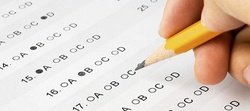ACT Guessing StrategyThe ACT doesn't penalize guessing, so you should never leave any answer blank even if you have to take a completely blind guess. Even with this information, students still make one huge mistake. Here we expose the biggest ACT guessing strategy mistake students make, and suggest a much better approach. We've seen students improve 1-2 points immediately after applying this 5-minute strategy. In addition, you may visit ACT Question Of The Day for more practice. The Biggest ACT Strategy Mistake ACT takers already know not to leave any questions blank – after all, the ACT doesn't penalize guessing. But many students take this to mean that they should spend substantial time on each question. These mistaken students think, "if I have to answer all questions, doesn't it make sense to spend at least 20-30 seconds looking at each?" The answer is a big, fat NO. Let me be clear: you have to give an answer for each question, but you DO NOT need to spend 20-30 seconds looking at each question. I am a strong advocate of blind guessing for many students on many types of questions. How and Why to Use Blind Guessing In particular, you should always blind guess when you encounter a problem way beyond your difficulty threshold. For example if you usually score a 15 on the math section, then most of the problems in the "hard" towards the end of the section will be way above your skill level. You get .20 points (in expectancy) just for blind guessing, which means you have a 1-in-5 chance of getting it right. And it takes 1 second! Now, since these are hard questions, and you usually score a 15, it may take you 2 minutes just to understand each question, and another 2 minutes to eliminate a couple of answer choices. This is a really bad use of four minutes to just get .4 extra points (in expectancy). Besides, you may not even eliminate correctly. Who Should Not Blind Guess: High Scorers High scorers, those with above a 20 on all sections, should not be using Blind Guessing. That's because, to maximize their points, they need to be spending time trying all of the questions. In such a case, since you're reading and understanding all questions anyway, you might as well make a more educated guess by eliminating some answers. When Everyone Should Not Blind Guess: Easy Questions For easy questions (those toward the beginning of the section), everyone should be trying them -- even if you're a low scorer, these are the questions that will give you your baseline points. On these questions, blind guessing is a big no-no.  What is Blind Guessing? Blind guessing is exactly what it sounds like -- guessing on a question without even reading it. Just filling in "C" or "F" at random. This might sound crazy, but for many students this is not a bad strategy. Source: prepscholar
0 Comments
Check Out All That Seattle Offers!Making the decision to study abroad in the United States will open doors to experiences and opportunities that will last a lifetime. Once you have committed to making this move, you have to decide which area of the country is right for you. Different regions of the United States offer different opportunities in education, culture and entertainment—all essential criteria for getting the most out of your college experience. Here’s our look into one of the most exciting and unique cities in the country—Seattle, Washington.  Seattle’s iconic skyline featuring the Space Needle and Mount Rainier Seattle is a coastal seaport city and the largest city in the Pacific Northwest region of North America. There are approximately 3.2 million people living in the Greater Seattle area, with about 570,000 living in the city itself. Its official nickname is the “Emerald City,” which is a reference to the evergreen forests that are throughout the state of Washington. In addition to its forestry, the area is known for its access to natural bodies of water. The city is located between Lake Washington and the Puget Sound, which connects to the Pacific Ocean. With so many natural attractions in the area, Seattle is a great place to engage in outdoor activities such as sightseeing, hiking, camping, kayaking and other activities to help you experience the natural beauty of the area.  The Seattle Great Wheel from Elliot Bay When you’re in Seattle, there’s always something to do. Seattle has a thriving music scene, three successful professional sports franchises and an annual film festival that attracts worldwide visitors. Home to the century-old Seattle Symphony Orchestra and the birthplace of grunge music, Seattle has deep roots in music. Over the years, Seattle has produced world-renowned artists including Ray Charles, Jimi Hendrix and Nirvana. With music everywhere, it’s not hard to find a good concert on any night of the week. Seattle is also the home to three major league sports teams: the Seattle Seahawks (American Football),Seattle Mariners (Baseball) and Seattle Sounders FC (Soccer). Whether you want to relax at a Mariners game or join the notoriously loud crowds at Seahawks and Sounders games, there’s sports action happening year-round in the city.  The Seattle Mariners’ home field in the SODO area One of the most prominent festivals in the city is the annual Seattle International Film Festival. During the 24-day festival, which began in 1976, hundreds of films from around the world are shown to thousands of attendees. Each year, the festival includes a “Secret Festival,” in which attendees are shown unspecified films and must sign an oath to not share any of the details from the films. Preparing for school While you’re studying in the States, earning a meaningful degree from an esteemed university is what’s most important. Seattle is home to several illustrious universities, both public and private, including the University of Washington. Seattle is also considered to be the most literate city in America, with the highest percentage of residents earning a college degree. Regardless of which school you choose to pursue an education, you’ll find Seattle to be a great community to meet your goals. Seattle also offers great housing options for students moving to the area. If living in a dorm isn’t right for you, choosing an apartment near campus can be perfect for students hoping to get the most out of their college experience. ApartmentSearch.com is a great resource to use when searching for apartments in the city. The search engine allows you to find an apartment in your ideal area, and also allows you to view crime statistics, the cost of living, local restaurants, the length of your commute and more. If your apartment is unfurnished, furniture rental is an economical and hassle-free way to furnish your home. CORT, the leading provider of furniture rental in the U.S., furnishes thousands of student apartments with furniture and accessories, with rental packages starting as low as $99 per month. Seattle homes & apartment buildings in the Lake Union area Seattle is a city that is full of diversity and never-ending excitement that can’t fit into a single post. To learn more about the “Emerald City,” do some research to see if this is the perfect fit for you! Also, be sure to pack a raincoat—it does rain from time to time. For more information on CORT’s furniture rental solutions, please visit www.CORT.com. Colleges and universities in the Seattle area A.C.E. Language Institutes Bellevue College Cascadia College Centralia College Edmonds Community College Green River College North Seattle Community College Pierce College South Seattle College Seattle University Seattle Central College Shoreline Community College University of Washington University of Washington - Bothell Source: Study in the USA
Here Are 3 Simple tips For SAT Test From UsKnow the order of difficulty SAT questions can be divided into three levels of difficulty: easy, medium and hard. The questions in the first third of each section are easy, those in the second third are medium and those in the last third are hard. (The only exception is the Reading Comprehension passages, which do not follow this order.) Every question on the SAT is worth an equal amount. So spend your time making sure you get the easy and medium questions correct and tackle the hard questions if time remains. Rushing through the test to get to the hardest questions will only drag your score down. Look for wrong answers instead of right answers Don't know the right answer? It happens. But if you know which choices are definitely wrong, you will significantly improve your chances of getting the question right. This is called process of elimination. Each question has 5 possible answer choices. Eliminate one or more possibilities, and your chances of guessing correctly are 25% or better. An incorrect guess will cost you only a quarter of a point. A correct guess will add an entire point. Let's say there are 8 questions where you eliminate 1 choice and guess among the remaining 4 choices. Statistically, you will guess correctly 2 times and incorrectly 6 times. You are rewarded 2 points and penalized 1.5 points. You just earned .5 points by guessing 8 times. Own your test booklet You paid for that test booklet, personalize it. Scratch work is extremely important on the SAT. Don't be embarrassed about it—writing in your test booklet will help you keep your mind focused.
Source: The Prince Review
|
Blog PurposeWe are happy to share our knowledge and experience in U.S. education, and to exchange ideas with students, parents, and schools. Please feel free to leave comments or questions here.Archives
February 2021
Categories
All
|
Copyright © 2014-2021 All Rights Reserved
Dr. Alex Li Education Services, Hong Kong
Dr. Alex Li Education Services, Hong Kong



 RSS Feed
RSS Feed